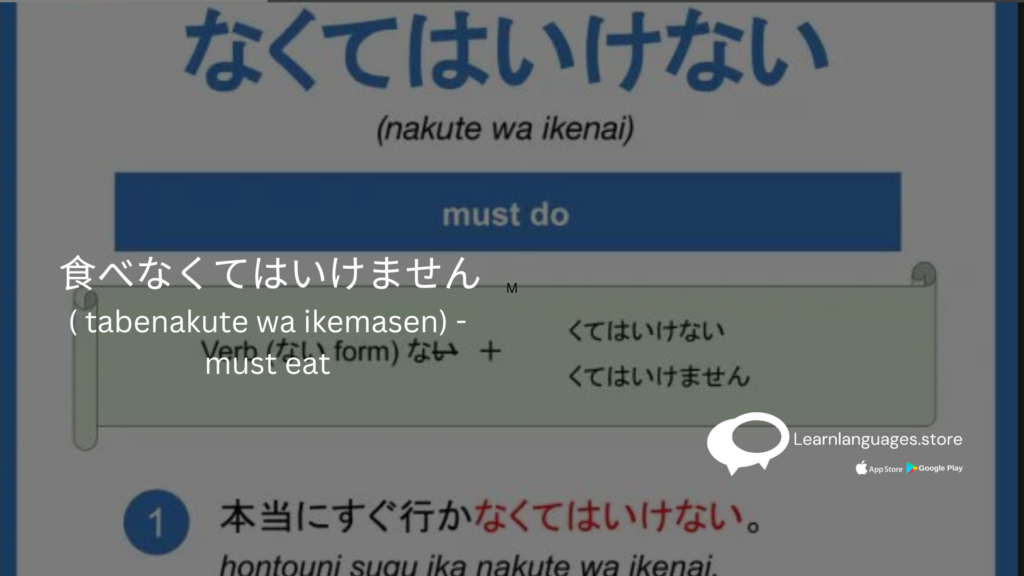Mastering 〜なくてはいけません (nakute wa ikemasen) in Japanese Grammar
Mastering 〜なくてはいけません (nakute wa ikemasen) in Japanese Grammar
Estimated reading time: 3 minutes
こんにちは (Konnichiwa)! Today, we’re diving into the essential Japanese expression 〜なくてはいけません (nakute wa ikemasen), which is used to express necessity or obligation. Whether you’re navigating daily tasks or understanding the nuances of Japanese conversation, this phrase is a must-know. Join me as we explore its structure, usage, exceptions, and, of course, enjoy some humorous examples along the way!

Understanding 〜なくてはいけません (nakute wa ikemasen)
Sentence Structure
The structure of 〜なくてはいけません (nakute wa ikemasen) is straightforward:
- Start with the negative form of a verb (〜ない, nai).
- Replace 〜ない (nai) with 〜なくて (nakute).
- Add はいけません (wa ikemasen) after the verb to indicate “must” or “have to.”
Examples with Different Verbs
- Verb: 食べる (たべる, taberu) – to eat
- Negative form: 食べない (たべない, tabenai)
- Combined: 食べなくてはいけません (たべなくてはいけません, tabenakute wa ikemasen) – must eat
- Verb: 行く (いく, iku) – to go
- Negative form: 行かない (いかない, ikanai)
- Combined: 行かなくてはいけません (いかなくてはいけません, ikanakute wa ikemasen) – must go
- Verb: 見る (みる, miru) – to see
- Negative form: 見ない (みない, minai)
- Combined: 見なくてはいけません (みなくてはいけません, minakute wa ikemasen) – must see
Pronunciation Guide Using Hindi Alphabets
- 食べなくてはいけません (tabenakute wa ikemasen) – ताबेनाकुटे वा इकेमासेन
- 行かなくてはいけません (ikanakute wa ikemasen) – इकानाकुटे वा इकेमासेन
- 見なくてはいけません (minakute wa ikemasen) – मिनाकुटे वा इकेमासेन
Example Sentences with Humor
- 食べなくてはいけません (たべなくてはいけません, tabenakute wa ikemasen) – must eat
- Example: 健康のために、毎日野菜を食べなくてはいけません。
- Pronunciation: けんこうのために、まいにちやさいをたべなくてはいけません。(Kenkou no tame ni, mainichi yasai o tabenakute wa ikemasen.)
- Hindi Translation: स्वास्थ्य के लिए, हर दिन सब्जियां खानी चाहिए।
- Humorous Twist: मुझे नहीं पता था कि सब्जियां खाने से मेरी गाजर से बात करने की क्षमता भी बढ़ेगी!
- 行かなくてはいけません (いかなくてはいけません, ikanakute wa ikemasen) – must go
- Example: 明日は大事な会議があるので、会社に行かなくてはいけません。
- Pronunciation: あしたはだいじなかいぎがあるので、かいしゃにいかなくてはいけません。(Ashita wa daiji na kaigi ga aru node, kaisha ni ikanakute wa ikemasen.)
- Hindi Translation: कल एक महत्वपूर्ण बैठक है, इसलिए मुझे कार्यालय जाना होगा।
- Humorous Twist: जब आपका बॉस आपको देखता है और कहता है, “आपके बिना बैठक इतनी मजेदार नहीं होगी!”
- 見なくてはいけません (みなくてはいけません, minakute wa ikemasen) – must see
- Example: この映画はみんなが話しているので、見なくてはいけません。
- Pronunciation: このえいがはみんながはなしているので、みなくてはいけません。(Kono eiga wa minna ga hanashite iru node, minakute wa ikemasen.)
- Hindi Translation: इस फिल्म के बारे में सब बात कर रहे हैं, इसलिए मुझे इसे देखना होगा।
- Humorous Twist: जब आप फिल्म के स्पॉइलर से बचने के लिए अपने दोस्तों के साथ छुपे रहते हैं!
Usage and Exceptions
General Usage
〜なくてはいけません (nakute wa ikemasen) is used to express strong necessity or obligation. It is equivalent to “must” or “have to” in English.
Exceptions
While 〜なくてはいけません (nakute wa ikemasen) is versatile, it’s essential to know that in casual conversation, 〜なくちゃいけない (nakucha ikenai) or 〜なければならない (nakereba naranai) might be used for a softer tone.
Identifying 〜なくてはいけません in a Sentence
Look for the negative form of a verb followed by 〜なくてはいけません. This structure clearly indicates a necessity or obligation imposed by an external factor or rule.
Conclusion
In conclusion, 〜なくてはいけません (nakute wa ikemasen) is a powerful tool in Japanese grammar, allowing speakers to convey necessity and obligations effectively. Whether you’re navigating through responsibilities or learning how to express requirements in Japanese, mastering this expression is crucial. So, practice with the examples, embrace the humor, and soon you’ll be using 〜なくてはいけません like a pro!
-
Product on sale
 Japanese N4
Japanese N4₹18,300.00
₹24,300.00 -
Product on sale
 Japanese N5
Japanese N5₹16,300.00
₹18,300.00
Learn Languages Store
Vashi,
Email: services@learnlanguages.store










